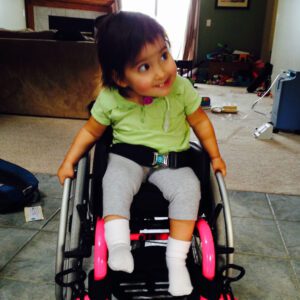 Children with special needs require a unique level of support and care. Not only are they learning basic life skills, such as communication, mobility, and how to interact with the world, but they’re also learning about their own abilities and limitations.
Children with special needs require a unique level of support and care. Not only are they learning basic life skills, such as communication, mobility, and how to interact with the world, but they’re also learning about their own abilities and limitations.
Check out the 18 tips we share with our nurses who are training to work with medically complex pediatric patients at home:
- Review basic child care and development, including how to change a diaper, swaddle a baby, make formula, and clean and sterilize bottles, pacifiers and toys.
- Recognize and encourage a child’s developmental level: play with them, and use appropriate toys, music, and books.
- Do not leave small pieces of medical equipment within reach as they may present a choking hazard.
- A child may not be able to communicate their needs as effectively as adults, so learn how your patient communicates their needs (crying, restlessness, rubbing head, etc.)
- Children need their sleep, so if they wake up too early or in the middle of the night, keep stimuli to a minimum. (After all, it’s not play time.) Encourage “normal” behaviors during sleep and wake times as much as possible.
- Always tell your patient what you are going to do before you do it. For example, “It’s time for trach care,” or “I need to suction you,” or “let’s brush your teeth,” etc.
- Be mindful of babies with trachs and reflux. Be gentle with them during and after feedings. Use quiet play during feedings, and keep them in an upright position for at least half an hour after feedings. Keep the exciting stuff (tummy/bouncy time, etc.) for just before feedings, when the child has an empty stomach and are less likely to vomit.
- If a child vomits, turn them to their side so they are less likely to aspirate any emesis into their trach, then suction.
- Be aware that suctioning too deep can cause gagging and vomiting (same with oral care). Provide oral care and pulmonary hygiene prior to feedings.
- A child needs oral care at least twice a day even if they do not have teeth. Do not force oral care as it can cause oral aversion, which can be difficult to reverse. A consistent, gentle approach with play and distraction will eventually allow you to be successful with oral care. All oral interactions should be positive.
- Know baseline lung sounds for your patient. Babies generally have more coarse breath sounds then older children or adults.
- Know where emergency equipment is at all times.
- Specifically, know the location of your patient’s emergency trach and obturator at all times in case they decannulate.
- Know how to ambu bag your patient with and without oxygen in case of an emergency.
- Parents are generally well-versed in their child’s care. Please be supportive of the parents, but also understand that you need to know and understand every aspect of the patient’s care, equipment, etc. Do not become complacent. For example, never think “I don’t need to know this because the parents do.”
- Encourage the family’s involvement by asking about the specifics of their child. If the family is doing something unsafe, please re-educate them respectfully.
- Be mindful of the fragility of preemies—even when they are older, they may have residual effects from their prematurity. For example, a “stomach bug” or “cold” can quickly progress to dehydration or pneumonia much faster for an “ex-preemie” then for another child.
- Children may desat when they cry. If they do not “recover” after a crying spell, then you will need to intervene using the following steps: First, try to determine why the child is crying. Second, try to cue into what the child wants or needs. Use a head to toe assessment to determine what is causing the child to cry. If needed, troubleshoot by asking the following questions:
- Does the child need to be repositioned?
- Is the child in pain? Is the child teething?
- Does the child have gas? Is the child pooping? Is the child constipated?
- Is the child being fed and having reflux?
- Does the child have soiled diaper?
- Is the child cold or hot?
- Is the child over stimulated? Is it loud, bright or several things going on at once? Is the child trying to sleep, are the lights on, or is it noisy?
- Is the child bored? Are you using different toys and books to encourage child’s development?
- Does the child want to be held? Does the child want to play?
- Are you anxious? Children, even babies, can pick up on a nurses’ anxiety and react to it. Remain calm.
- Are you being too rough with the child? Remember to use a gentle touch and voice with the child. Be mindful of how your behavior can affect a child.
When in doubt, call the patient’s Clinical Manager or Nurse Manager 24/7 On-Call with any cncerns.
If you currently work at Independence Plus, join us next week on Wednesday, April 22 at 5:30 p.m. for more information on therapeutic playtime.
